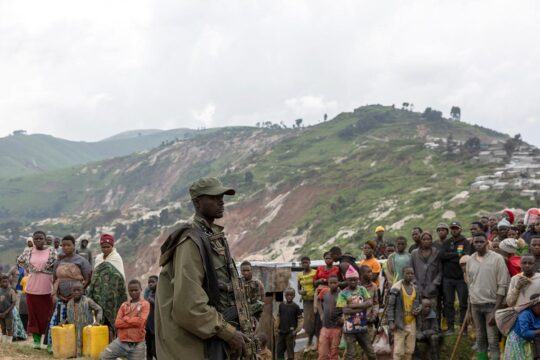Several people died in a second day of violence in DR Congo Tuesday, with three opposition HQ buildings torched in clashes between police and opponents of President Joseph Kabila.
The fresh violence came after a bloody day on Monday during which opposition groups said more than 50 people had died in protests calling for Kabila's resignation.
The government put the toll from the first day of clashes at 17 -- three policemen and 14 "looters".
Protesters attacked several police outposts for a second day running on Tuesday amid reports of looting.
The national secretary of the main opposition group blamed a regime "commando" unit for torching their offices after ruling party buildings were set ablaze on Monday.
"Does a normal state respond with reprisals?" said Felix Tshisekedi from the Union for Democracy and Social Progress (UDPS). "We are facing a rogue state."
Gunfire was heard on Tuesday morning near the UDPS headquarters.
At least two burnt bodies could be seen in the fire-ravaged building. Two others were burned alive and another injured.
A tearful woman in her 40s said that her husband had been there when unidentified assailants attacked the building.
"I've just put my husband's body in the morgue," she told AFP.
Two other opposition parties -- the Forces of Union and Solidarity (FONUS) and the Lumumbist Progressive Movement (MLP) -- also saw arson attacks at their offices.
A FONUS member said that armed men in civilian clothes arrived at the office in a jeep, sprayed petrol and set the building on fire.
- Church quits talks -
Jose Maria Arnaz, the director of the Joint Office of the United Nations for Human Rights in DR Congo, inspected the UDPS office to "investigate" the fire.
"We are seeing what we can do to reduce the political tensions and bring those responsible for deaths to justice," he told AFP.
Diplomatic and security sources as well as residents reported clashes between the police and youths in the central and southern districts of Kinshasa, a teeming city of some 10 million.
Most residents stayed home, accustomed to violence in the streets. Shops and schools were closed.
By Tuesday evening, calm seemed to be restored in most of the capital.
The violence broke out just before an opposition rally on Monday by demonstrators who fear Kabila -- who has ruled the mineral-rich Democratic Republic of Congo since 2001 -- is planning to extend his rule unconstitutionally.
Kabila's mandate ends on December 20 and although the constitution bans him from running for a third term, he has made no effort to schedule elections which would be practically impossible to organise in the vast country before the year is up.
- 'Kabila must not run' -
A fringe opposition group has been meeting with the government in a bid to organise an elections schedule, but veteran opposition leader Etienne Tshisekedi has refused to participate.
On Tuesday, Catholic Church leaders vowed to stay away from the negotiating table in protest against the violence, "out of respect" for the victims.
And the African Union, which is mediating the so-called "national dialogue", said the talks would be suspended until Friday.
Church leaders also took a clear-cut position on Kabila's fate.
"It must be clearly stated and stipulated that the current president of the republic will not be a candidate in the next election, which must be held as soon as possible," the Episcopal Conference of the Democratic Republic of Congo said in a statement.
The opposition said security forces had fired live ammunition at protesters and urged supporters to pour onto the streets again to demand Kabila step down on schedule.
Human Rights Watch researcher Ida Sawyer said the monitor "received credible reports that security forces shot dead at least 20 people (on Monday) during Kinshasa protests against election delays".
The clashes were the worst violence in the capital since January 2015 when a police crackdown on another opposition protest left several dozen people dead.
In May, the Constitutional Court said Kabila could remain in office in a caretaker capacity until an election is held, triggering a wave of angry protests.
French President Francois Hollande, speaking in New York on Tuesday, urged DR Congo to hold elections on schedule, deploring the growing political violence.
A fringe opposition group has been meeting with the government in a bid to organise a schedule, but veteran opposition leader Etienne Tshisekedi has refused to participate in the talks.
A former Belgian colony, DR Congo has been wracked by unrest since independence in 1960 and has never known a peaceful transition of power.



